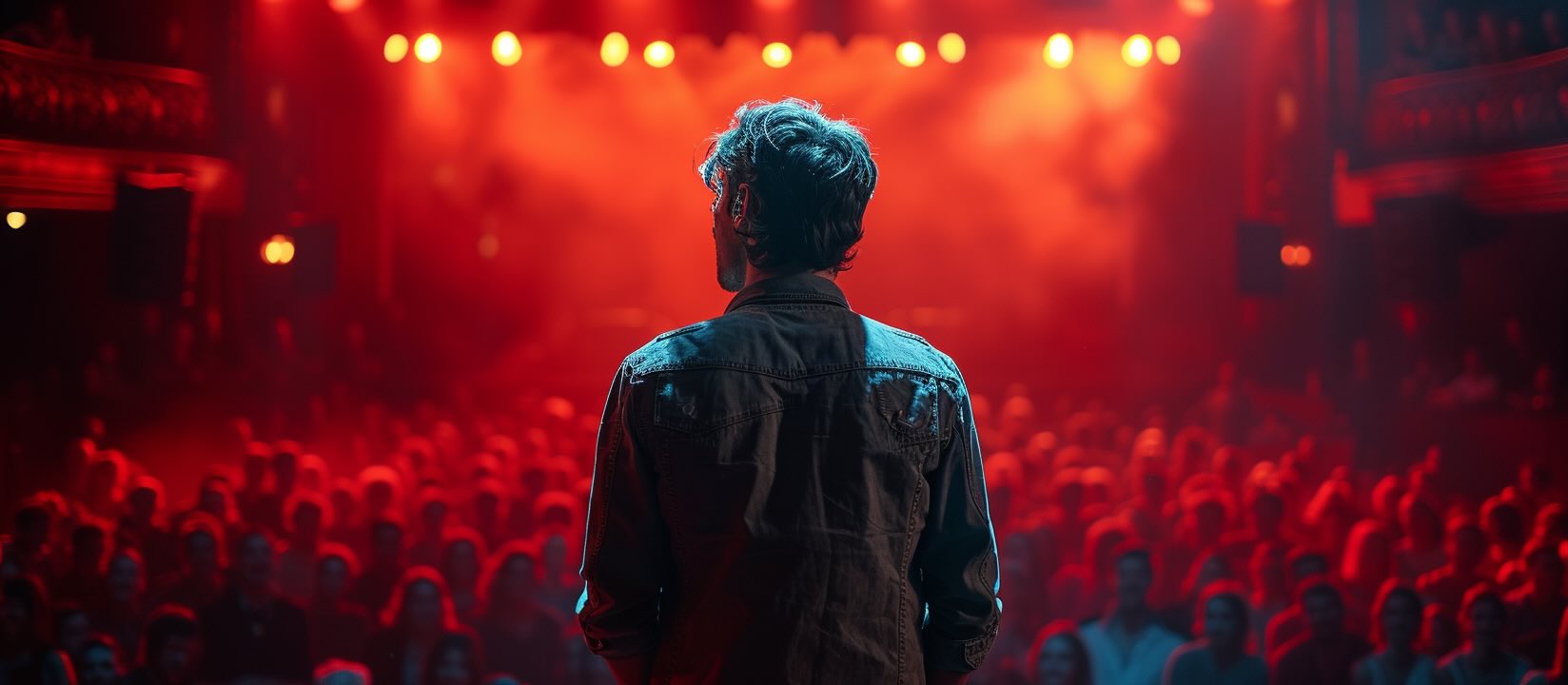
Diving into the world of stand-up comedy can seem like a daunting journey. It’s not just about making people laugh; it’s about connecting with an audience and sharing a part of ourselves in the most vulnerable way. We’ve all been there, dreaming of standing under those bright lights, mic in hand, delivering lines that have the crowd roaring with laughter.
But where do we start? Becoming a stand-up comedian involves more than just having a knack for jokes. It’s about honing your craft, understanding your audience, and, most importantly, never giving up, even when the laughs seem far away. Let’s embark on this journey together and uncover the steps to turn those dreams into reality.
What is stand-up comedy?
The Art of Making People Laugh
In our journey to becoming stand-up comedians, it’s vital we understand what lies at the heart of this craft. Stand-up comedy is, at its core, The art of making people laugh. This might sound simple, yet it involves a complex blend of timing, storytelling, and persona. It’s not just about delivering jokes; it’s about connecting with an audience on a personal level, sharing our experiences, and oftentimes, our vulnerabilities. Through laughter, we bridge gaps and form a bond, making this art form unique and incredibly impactful.
The power of stand-up comedy lies in its live performance aspect. We get instant feedback from our audience, allowing us to adjust and refine our material in real time. It’s this immediate exchange of energy that makes stand-up exhilarating for both the comedian and the audience. We learn to read the room, a skill that’s invaluable as we aim to resonate with diverse groups of people. Our goal is to leave the audience more joyful than they were when they came in, and achieving that is a testament to our artistry and understanding of the craft.
The Different Types of Comedy
Diving deeper into stand-up comedy means recognizing the variety within the genre. Here, we explore the main styles we might encounter or choose to embody:
- Observational Comedy: Focuses on everyday life, highlighting the humor in mundane situations. It’s relatable and often leaves the audience nodding in agreement.
- Political Comedy: Involves satire and commentary on political events, figures, and institutions. This style requires a keen understanding of current affairs and a knack for walking the fine line between humor and controversy.
- Dark Comedy: Delves into topics that are generally considered taboo or serious, finding humor in the darker aspects of life. This style can be very powerful but requires a delicate balance to avoid offending the audience unnecessarily.
- Anecdotal Comedy: Based on personal stories and experiences. It’s highly relatable and provides a window into the comedian’s world, building a personal connection with the audience.
- Physical Comedy: Involves the use of body movements, facial expressions, and non-verbal cues to elicit laughs. It’s a test of our ability to communicate humor without relying solely on words.
Each type of comedy has its own set of challenges and rewards, and as aspiring stand-up comedians, it’s crucial we explore these different styles to find where our unique voice fits best. Whether we lean towards observational humor or feel drawn to the world of dark comedy, understanding the nuances of each type will equip us with the tools we need to succeed on stage.
Characteristics of a successful stand-up comedian
Confidence and Stage Presence
When we dive into the world of stand-up comedy, two of the most critical traits a comedian can possess are confidence and stage presence. It’s not just about delivering jokes; it’s about commanding the stage and connecting with every single person in the audience. Confidence allows a comedian to recover gracefully from a joke that might not land as intended and to handle hecklers or unexpected interruptions without losing their cool. Stage presence, on the other hand, is about the energy and persona a comedian brings to their performance. It’s what makes them memorable and can turn a good set into an unforgettable experience. Successful comedians often practice in front of friends, family, or even in front of a mirror to hone these skills. They understand that stage fright is a part of the process but also know that confidence grows with each performance.
Sense of Humor
At the heart of stand-up comedy lies a keen Sense of humor. This might seem obvious, but the ability to see the funny side of life, to twist everyday situations into a fabric of laughter, is a talent that not everyone possesses in equal measure. A successful comedian knows how to tap into diverse topics and find humor that resonates with a wide audience. They’re not afraid to experiment with their personal style, whether it be dry, witty, slapstick, or dark humor. Importantly, they understand that timing is crucial in comedy. Knowing when to deliver the punchline, when to pause for effect, and how to read the room ensures that jokes land more effectively.
Observation and Storytelling Skills
Strong observation and storytelling skills are what enable a comedian to draw the audience into their world. Being observant means noticing the little details and absurdities of everyday life that others might overlook and translating those observations into relatable content that strikes a chord with the audience. Effective storytelling, meanwhile, is about weaving these observations into narratives that captivate and entertain. It’s not just about what is being said, but how it’s said. The best comedians are those who can take a mundane situation and spin it into a hilarious tale that keeps the audience hanging on their every word. They craft stories that paint vivid pictures, making the audience feel as if they’re a part of the experience. Developing these skills often involves a lot of writing, rewriting, and testing material on different audiences to see what resonates best.
By focusing on honing these characteristics, aspiring comedians can significantly improve their chances of making an impact in the competitive world of stand-up comedy.
Developing your comedy material
In the journey to become a stand-up comedian, one of the most crucial steps is developing your comedy material. This phase is not just about writing jokes; it’s about crafting a unique comedic perspective that resonates with your audience. Let’s dive into the key strategies for developing compelling comedy material.
Finding Your Comedic Style
Identifying your comedic style is the cornerstone of your stand-up career. It’s what sets you apart in the crowded comedy scene. We all have different personalities and perspectives, and tapping into our unique traits can help us find our voice on stage. Here are a few steps to help pinpoint your style:
- Watch a variety of comedy shows and specials. Note what resonates with you and why.
- Experiment with different types of comedy, from observational to dark humor.
- Reflect on the feedback from your audience. Their reactions can guide you towards your strongest suit.
Remember, your comedic style might evolve over time, and that’s completely normal. The key is to remain authentic and true to yourself.
Observing the World Around You
Great comedy often stems from a keen observation of everyday life. The world around us is full of humorous situations waiting to be uncovered. To enhance your observational skills:
- Carry a notebook or use a smartphone app to jot down funny or peculiar situations you encounter daily.
- Pay attention to the mundane; sometimes, the most relatable humor is found in the everyday experiences we often overlook.
- Engage with diverse communities and environments. New experiences can offer fresh material and perspectives.
Observing the world with a comedic lens allows us to connect with our audience on a deeper level. It’s about sharing our unique take on universal experiences.
Writing and Refining Your Jokes
Writing is a process, and crafting jokes is no exception. It’s rare for a joke to be perfect on the first try, which is why refining your material is a critical step. Here’s how to approach the writing and refining process:
- Set aside dedicated time for writing. Consistency helps in honing your comedic voice.
- Don’t censor yourself in the early stages of writing. Let the ideas flow freely and edit later.
- Test your material in front of an audience, whether it’s an open-mic night or a small gathering of friends. Pay attention to their reactions and adapt accordingly.
Recording your performances is invaluable. It allows you to analyze your delivery and timing, providing insights on where to tighten up or expand your jokes.
In the creation of stand-up comedy material, patience and persistence are our allies. By finding our comedic style, observing the world, and meticulously writing and refining our jokes, we lay the foundation for impactful and memorable performances.
Improving your comedic delivery
In the journey to become a standout stand-up comedian, mastering the art of delivery is as crucial as the content itself. We’ve discovered that how you present your material can make or break the connection with your audience. In this section, we’ll dive deep into techniques for refining your comedic delivery, ensuring each joke lands with the impact you’re aiming for.
Practicing Your Timing and Pacing
One of the first aspects we need to emphasize is the importance of timing and pacing. Timing is everything in comedy, and getting it right can dramatically increase the effectiveness of your performance. Here’s how you can hone these critical skills:
- Record and Listen: Always record your performances and listen to them. Identify moments where a longer pause could’ve added suspense or where quicker delivery might have kept the momentum.
- Experiment: During open mics or smaller shows, experiment with different pacing for the same joke. Notice how audience reactions vary and adjust accordingly.
- Rhythm Is Key: Find a rhythm that works for you and your style. Sometimes, a deliberate slow pace can build anticipation, while at other times, a rapid-fire delivery can amplify the humor.
Using Body Language and Facial Expressions
What we say is important, but how we say it, including our body language and facial expressions, can significantly amplify a joke. We’ve learned that:
- Be Expressive: Your face is an incredibly powerful tool. Practice your expressions in front of a mirror to find what works best for each joke.
- Body Language: Use your body to add to the story. Gestures can illustrate your jokes, making them more relatable and engaging.
- Consistency: Make sure your expressions and body language match the tone of your joke. Incongruence can confuse the audience and dilute the punchline.
Connecting With the Audience
Ultimately, stand-up comedy is about the connection between us and our audience. Making that connection can elevate a performance from good to unforgettable. Here’s how to achieve that:
- Eye Contact: Making eye contact with various audience members can make your performance feel more personal and engaging.
- Read the Room: Be attentive to the audience’s reactions and adjust your performance dynamically. If a particular topic or style isn’t resonating, be flexible enough to switch gears.
- Relatability: Share stories or jokes that evoke shared experiences or emotions. When the audience can see themselves in your performance, they’re more likely to stay engaged and responsive.
By focusing on these key aspects of comedic delivery, we’re not just telling jokes; we’re crafting experiences that resonate on a deeper level. Improving our timing, using our bodies effectively, and forging a genuine connection with every audience ensures that we’re not just passable comedians, but memorable ones.
Overcoming stage fright
Embarking on a journey to become a stand-up comedian, we’re bound to encounter one of the most common hurdles – stage fright. It’s a challenge that has the power to deter even the most talented artists. However, understanding this fear, learning how to manage it, and building confidence are crucial steps to overcoming it and succeeding in the world of comedy.
Understanding the Fear of Public Speaking
At the core, stage fright is essentially a fear of public speaking. It’s a natural response triggered by the anticipation of being judged or failing in front of an audience. This fear can manifest physically through symptoms like shaking hands, a racing heart, or a shaky voice. Recognizing that this fear is a universal experience helps in realizing we’re not alone in our struggle. Many successful comedians have faced and overcome this hurdle, proving it’s an obstacle that can indeed be conquered.
Techniques for Managing Stage Fright
Managing stage fright doesn’t come overnight, but with the right strategies, we can significantly reduce its impact. Here are a few techniques that have been proven effective:
- Preparation Is Key: Knowing our material inside out gives us a solid foundation and reduces the fear of forgetting our lines.
- Breathing Exercises: Controlled breathing can help calm our nerves. Practicing deep, slow breaths before going on stage can be incredibly soothing.
- Visualize Success: Picturing a successful performance can boost our morale and reduce anxiety.
- Start Small: Beginning our journey in smaller, more intimate venues can help us gradually build our confidence in front of an audience.
Incorporating these techniques into our routine can dramatically improve our ability to manage stage fright, making it less of a barrier to our success.
Building Confidence Through Practice
Confidence, especially on stage, isn’t innate—it’s built through consistent practice and experience. The more we perform, the more familiar we become with the dynamics of being on stage, and the more adept we become at handling unexpected situations. Here’s how practice aids in building confidence:
- Regular Performances: Regular gigs, even in small venues, help us gain experience and become more comfortable in front of an audience.
- Feedback Loop: Constructive feedback from peers and audience members can provide insights into our performance and areas for improvement.
- Recording Performances: Watching recordings of our performances can help us identify strengths and weaknesses from an audience’s perspective.
Practice doesn’t just make perfect—it also fosters a level of confidence that can diminish the grip of stage fright.
Building your career as a stand-up comedian
Once we’ve tackled the basics of stand-up comedy, including overcoming stage fright and developing our material, it’s time to focus on building a career in this competitive field. Success in stand-up comedy doesn’t happen overnight; it requires persistence, creativity, and a strategic approach to carving out a unique space in the comedy world. Here, we’ll delve into the essential steps to establish and grow our career as stand-up comedians.
Open Mic Nights and Comedy Clubs
One of the foundational steps in launching our comedy career is to get as much stage time as possible. Open mic nights and comedy clubs offer the perfect platforms for this. These venues are not just places to perform; they’re also excellent for testing new material, refining our delivery, and understanding audience dynamics. Here’s why they’re so crucial:
- Immediate Feedback: There’s no substitute for the immediate reaction we get from a live audience. This feedback is invaluable for tweaking our performance.
- Experience: Consistently performing helps us build confidence and stage presence, which are key to captivating an audience.
- Community: These venues allow us to become part of the comedy community, offering support and opportunities to connect with fellow comedians.
Networking and Getting Noticed
In the world of stand-up comedy, who we know can be just as important as how funny we are. Networking is critical to getting noticed and landing gigs. Here are some strategies to enhance our networking efforts:
- Attend Comedy Shows: Going to shows is not only a great way to support fellow comedians but also to meet club owners, bookers, and more established comedians who can offer advice or opportunities.
- Social Media and Online Forums: Engaging with the comedy community online can increase our visibility and connect us with both fans and industry professionals.
- Comedy Festivals: Participating in or attending comedy festivals is an excellent way to network, showcase our talent, and gain exposure.
Taking Advantage of Online Platforms
The digital era has opened up new avenues for stand-up comedians to reach audiences far beyond traditional comedy clubs. Here’s how we can leverage online platforms:
- YouTube: Creating a YouTube channel to post clips of our performances can help us reach a global audience and attract notice from industry professionals.
- Social Media: Platforms like Instagram and Twitter are not only for networking but also for sharing our content, engaging with fans, and building a following.
- Podcasts: Starting or guesting on podcasts related to comedy can increase our exposure, allow us to share our journey, and connect with listeners on a personal level.
Building a career in stand-up comedy involves more than just honing our craft; it requires a strategic approach to gaining exposure, connecting with audiences, and networking within the comedy community. By embracing both traditional and new platforms, we can lay the groundwork for a successful career in stand-up comedy.
Key Takeaways
- Stand-up comedy is more than just telling jokes; it requires a deep connection with the audience through timing, storytelling, and persona, making it a unique and impactful art form.
- Understanding different types of comedy, such as observational, political, dark, anecdotal, and physical, helps aspiring comedians find their unique voice and approach to humor.
- Key attributes of successful stand-up comedians include confidence, stage presence, a sense of humor, and strong observation and storytelling skills, all of which can be honed through practice and feedback.
- Developing a personal comedic style involves observing the world, writing and refining material based on feedback, and committing to continuous improvement in joke delivery and audience engagement.
- Overcoming stage fright is a common challenge for comedians, but can be managed through preparation, breathing exercises, visualization, and starting with smaller performances to build confidence.
- Building a career in stand-up comedy requires persistence, networking, leveraging both traditional platforms like open mics and comedy clubs, as well as digital platforms.
Conclusion
As we delve deeper into the world of stand-up comedy, it’s clear that this career path is as challenging as it is rewarding. We’ve covered the essentials, from understanding the different comedy styles to honing our craft through relentless practice and exposure. Remember, each step we’ve discussed is a building block towards becoming a successful stand-up comedian.
One can’t overlook the importance of stage presence and audience connection. These are not skills that one is simply born with; they’re developed through experience, feedback, and sometimes, hard lessons. Embracing the inevitable bumps along the road is part of what shapes us into resilient and adaptive performers. Attending comedy shows as an audience member serves a two-fold purpose. You can analyze how experienced comedians command the stage, and it’s a chance to invite friends and family to support your own early performances – so keep an eye out for comedy show tickets at both large venues and smaller open mic nights!
Networking and building a community around us is as crucial as perfecting our set. The relationships we foster within the comedy world can open doors to opportunities that were previously out of reach. Whether it’s a guest spot at an established show or valuable advice from a seasoned comedian, the benefits of a robust network are undeniable.
Finally, we cannot stress enough the importance of embracing digital platforms. The internet has democratized content distribution, allowing comedians to reach audiences far beyond the traditional club settings. Understanding how to leverage social media, podcasts, and online video can amplify our reach and provide feedback loops that can significantly accelerate our growth as comedians.
In embracing these insights, we’re better equipped to navigate the complex yet exhilarating path of stand-up comedy. Let’s continue to explore, learn, and laugh as we forge our unique journeys in the world of comedy.
Frequently Asked Questions
What Are the Key Challenges in Becoming a Stand-Up Comedian?
Becoming a stand-up comedian involves facing challenges like connecting genuinely with the audience, navigating different types of comedy to find one’s unique voice, and handling the live, real-time feedback nature of stand-up performances.
How Important Is Stage Presence in Stand-Up Comedy?
Stage presence is crucial in stand-up comedy, as it helps in engaging the audience, delivering jokes effectively, and managing live feedback. A strong presence can significantly enhance a comedian’s impact on the audience.
What Types of Comedy Are Explored in Stand-Up?
Stand-up comedy explores various types, including observational, political, dark, anecdotal, and physical comedy. Each type presents its challenges and rewards, allowing comedians to find their specific niche.
What Traits Define a Successful Stand-Up Comedian?
Successful stand-up comedians typically possess confidence, a keen sense of humor, strong observation and storytelling skills, and the ability to connect with their audience through shared experiences and vulnerabilities.
How Can Aspiring Comedians Develop Their Comedy Material?
Developing comedy material involves observing the world, finding a comedic style that resonates, writing and refining jokes, and practicing extensively. Authenticity and persistence are key to creating memorable performances.
Why Are Open Mic Nights and Comedy Clubs Important?
Open mic nights and comedy clubs provide essential platforms for gaining stage experience, receiving audience feedback, and refining performances. They are pivotal in the developmental journey of a comedian.
How Can Comedians Expand Their Careers in the Digital Age?
Expanding a career in stand-up comedy today involves leveraging online platforms like YouTube, social media, and podcasts for broader outreach and networking within the comedy community to build a wider audience.
What Role Does Networking Play in Stand-Up Comedy?
Networking is vital in stand-up comedy for getting noticed, forming relationships within the comedy community, attending comedy shows, and engaging with fans and fellow comedians online and at festivals.



Leave a Reply